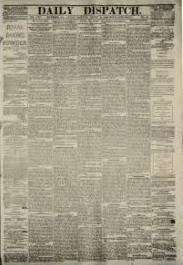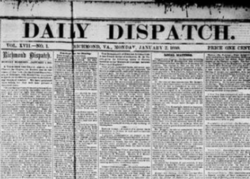Our Diverse Heritage: Marion’s Black History Part 2
Celebrating Black History Month in Marion County
February 5, 2024
Read Part 1 here.
Part 2: The Trial (Meade vs. Johnson, 1866)
When West Virginia became a state, the issue of slavery was undecided until 1865. In 1866 the West Virginia legislature gave Black people the right to testify against White people in court. Before this, Black people had been allowed to testify only in cases involving other Blacks. Now no longer married to Ruhama, Meade just wanted his money returned, and estimated it to be around $1100 in payments made over the prior six or seven years. Johnson refused to give the money back, so Meade filed suit in Harrison County in the summer of 1866.
During the Harrison County court session in October, the Wheeling Intelligencer reported: “A curious case involving the civil rights of a Black man is pending in the Circuit Court of Harrison County. About the expiration of his (Johnson’s) term of office as Governor, Alfred Meade, a colored man who had saved some money as a waiter in the Richmond hotels, found himself able to buy himself, he being a slave.”
The newspaper account stated that Meade followed Johnson back to Western Virginia where he prospered so well ‘that he accumulated money that he loaned at different times to the ex-Governor to an amount over $1000, payable with interest between $1100-1200.’
This story was reprinted in major cities around the country including Richmond’s Virginia Dispatch that reported on October 9, 1866: “An interesting case regarding the freedom that freedmen have is expected to be brought before the courts. The basic question is whether or not a White man is required to pay his debts to a Black freedman.”
The article noted that after Johnson’s service to the Confederacy, he declared ‘situations had changed’ and asserted that Meade had been his slave at the time of the money exchange. Therefore, it was not Meade’s money but Johnson’s. Further, Johnson argued that he did not grant Ruhama her freedom; it came with federal law in 1865. Johnson claimed that as Meade was a slave, borrowing from Meade was borrowing from himself; thus he did not owe money. In addition, Johnson explained that this money was only to purchase Ruhama when enough ‘had been paid.’ Meade countered that he was a freedman, and his money was earnest. Munford even testified to this fact according to the press reports.
Despite Munford’s testimony, the Harrison County jury ruled in favor of the defendant. The Wheeling Intelligencer as well as the Richmond Dispatch noted: “In the moral aspect there is but one side and the slave code existing before the rebellion may defraud this black man out of his honest earnings. It is certainly true that Johnson’s claim to the money for the purchase of the woman’s freedom has no force even in law, because his part of that contract, if it ever existed, never was performed. He did not give her freedom. That was given her by public law.”
The Intelligencer noted that “the case is a novel one and the trial of it will be attended with no little interest. The (slave) code is but a fair illustration of that infamous system of oppression and wrong which the Copperheads here and the Rebels in the South unit (are) desiring to re-establish.”
As far as the national press coverage in 1866, it is interesting to note that the Wheeling Intelligencer and Dispatch extensive reporting of this story is in part to the close personal friendship of Francis Pierpont and city editor, Archibald Campbell. Campbell was the only newspaper editor in Virginia who endorsed Abraham Lincoln’s candidacy for the office of president of the United States.
Request a copy of our Civil War or Marion County History Guide here.

